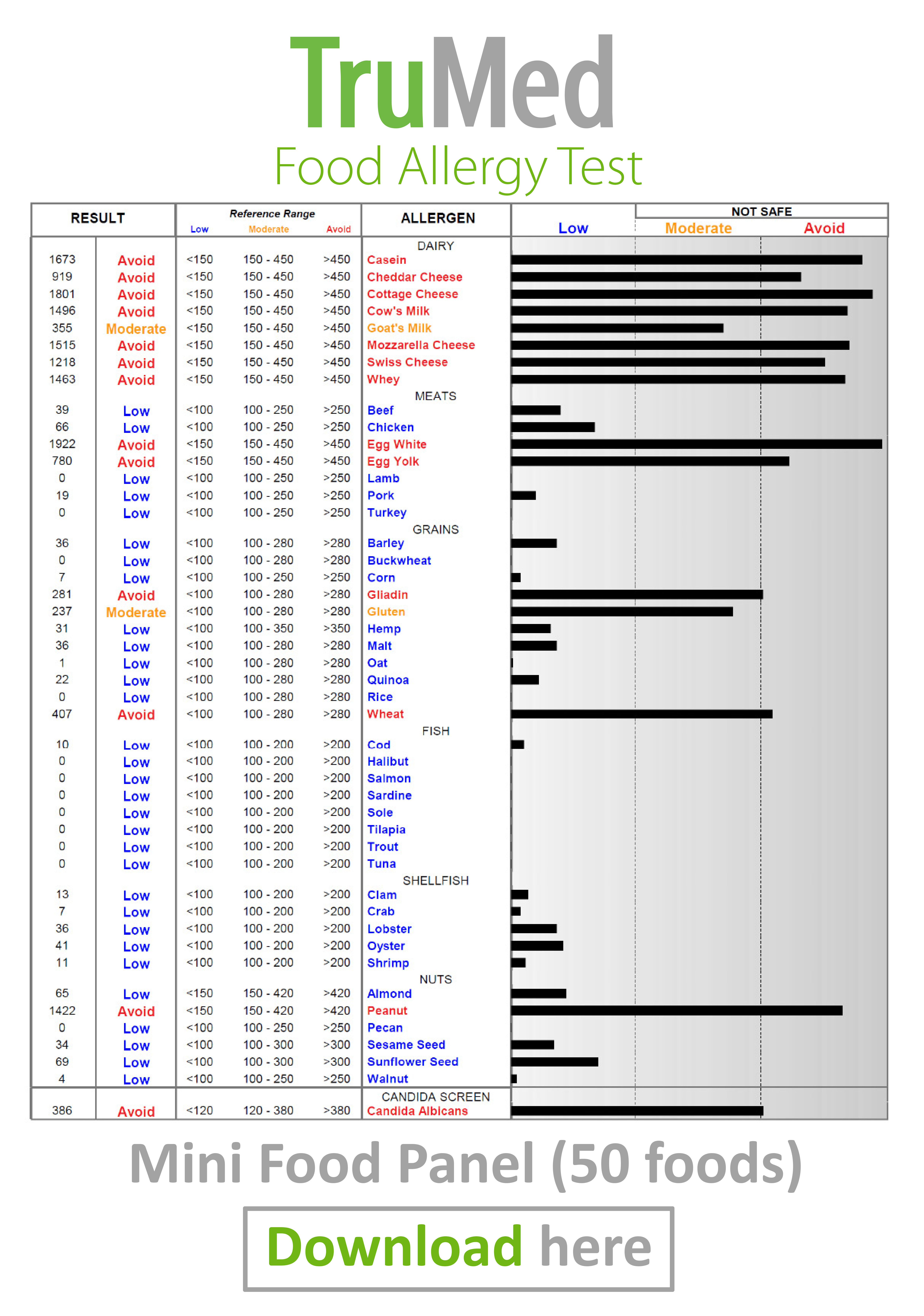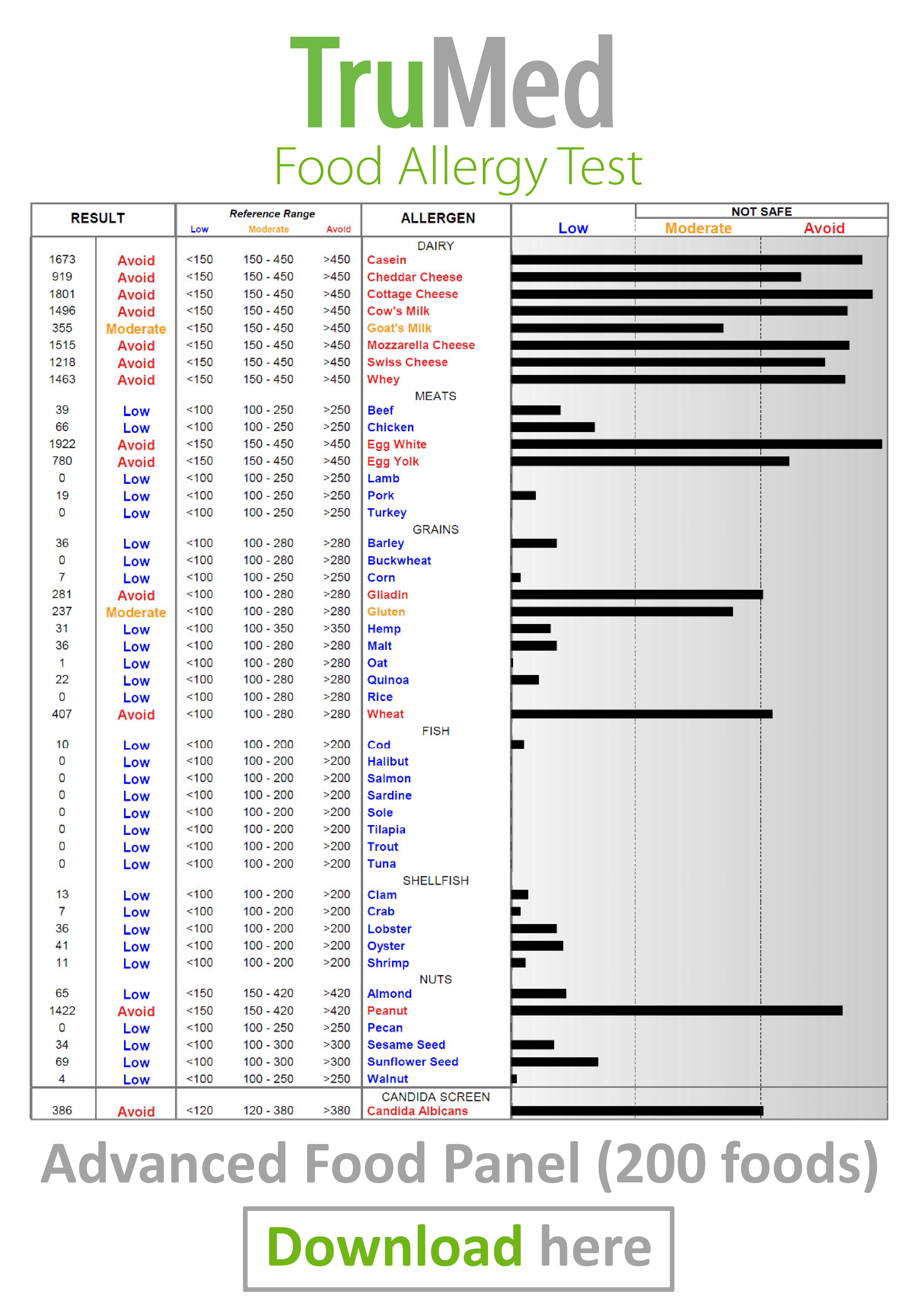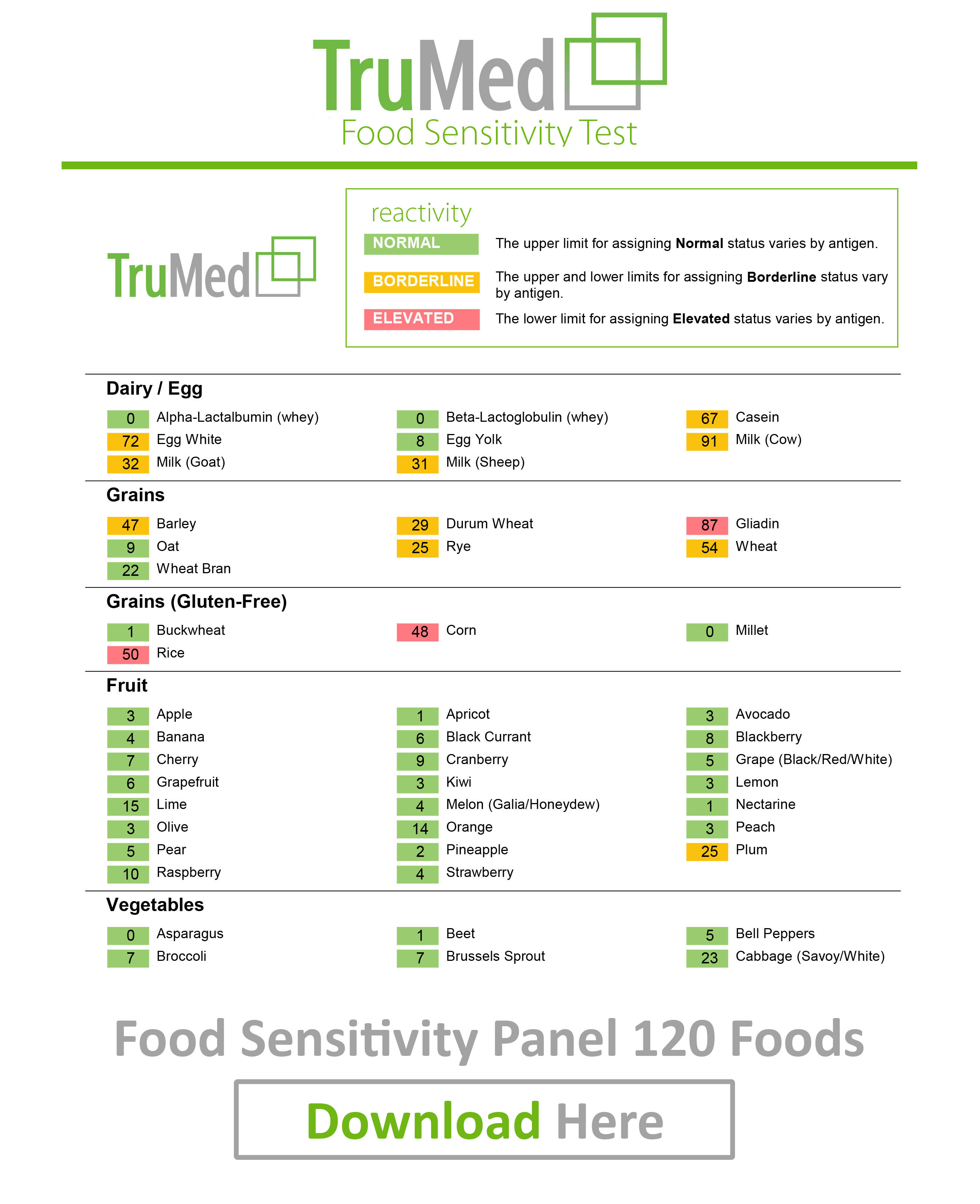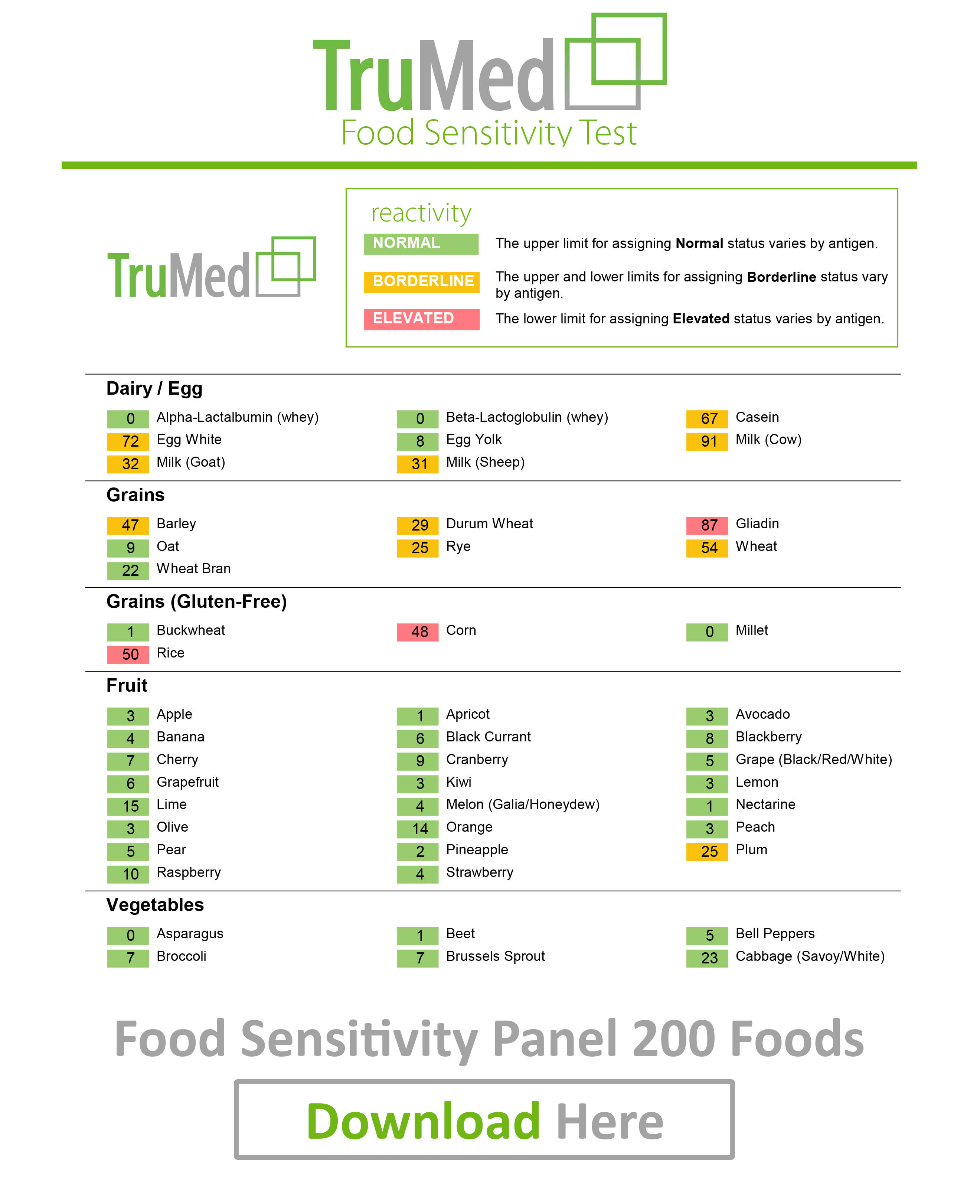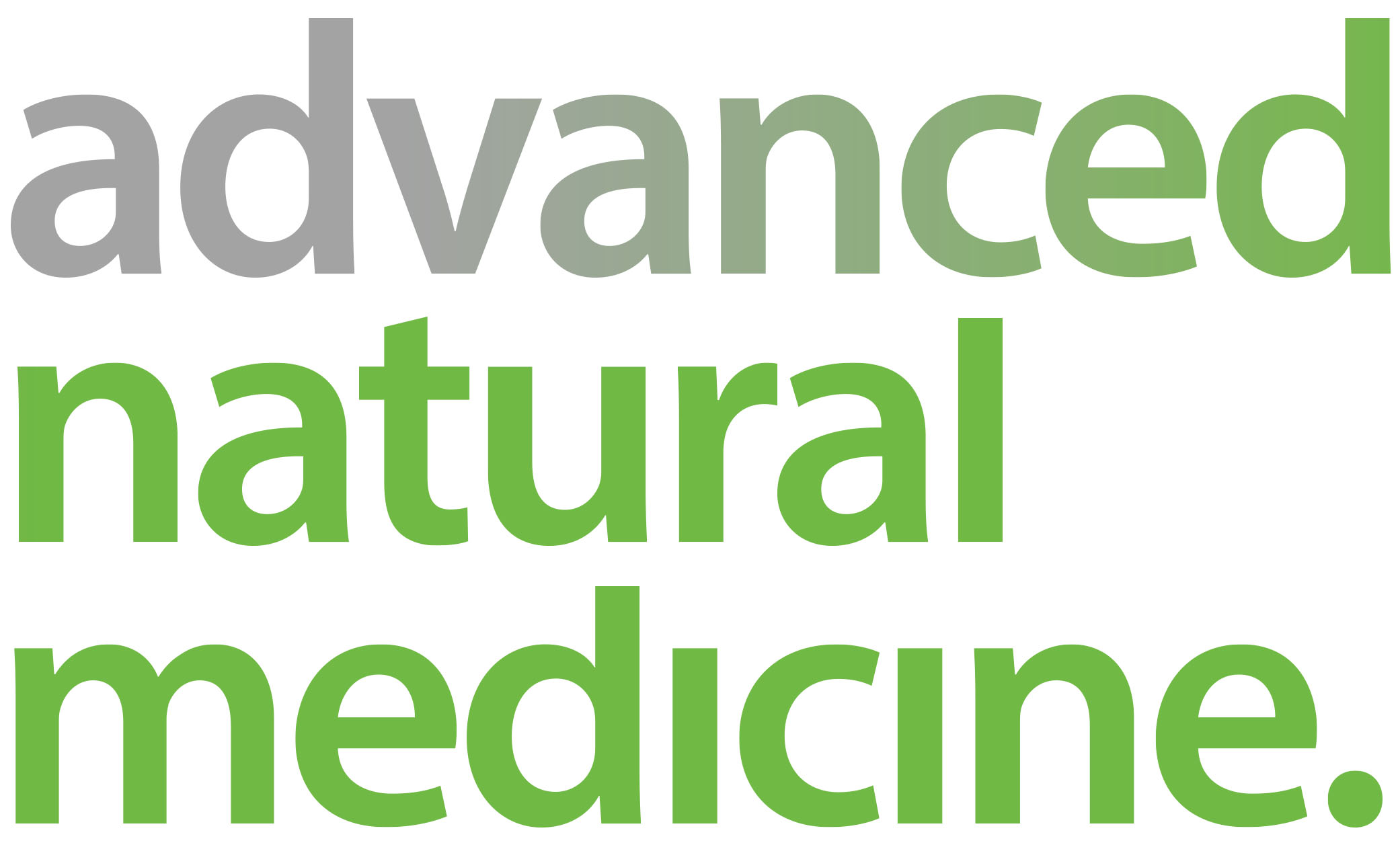Food Sensitivity & Allergy Testing in EdmontonComprehensive Food Sensitivity & Food Allergy Testing |
||||||||||||
|
Test reactivity to 50, 100 and 200 foods We can test children and adults at our Edmonton office
Food Testing is a private service - costs not covered by Alberta Health We'll help you choose the most appropriate testing for your concerns We no longer test for anaphylactic allergies See costs associated with testing |
||||||||||||
 Food Sensitivity & Allergy Testing in Edmonton |
||||||||||||
|
Digestive concerns, such as bloating, gas and IBS are common reasons for Food Sensitivity & Allergy Testing. Just a small sample of blood is needed to test intolerance to hundreds of foods.
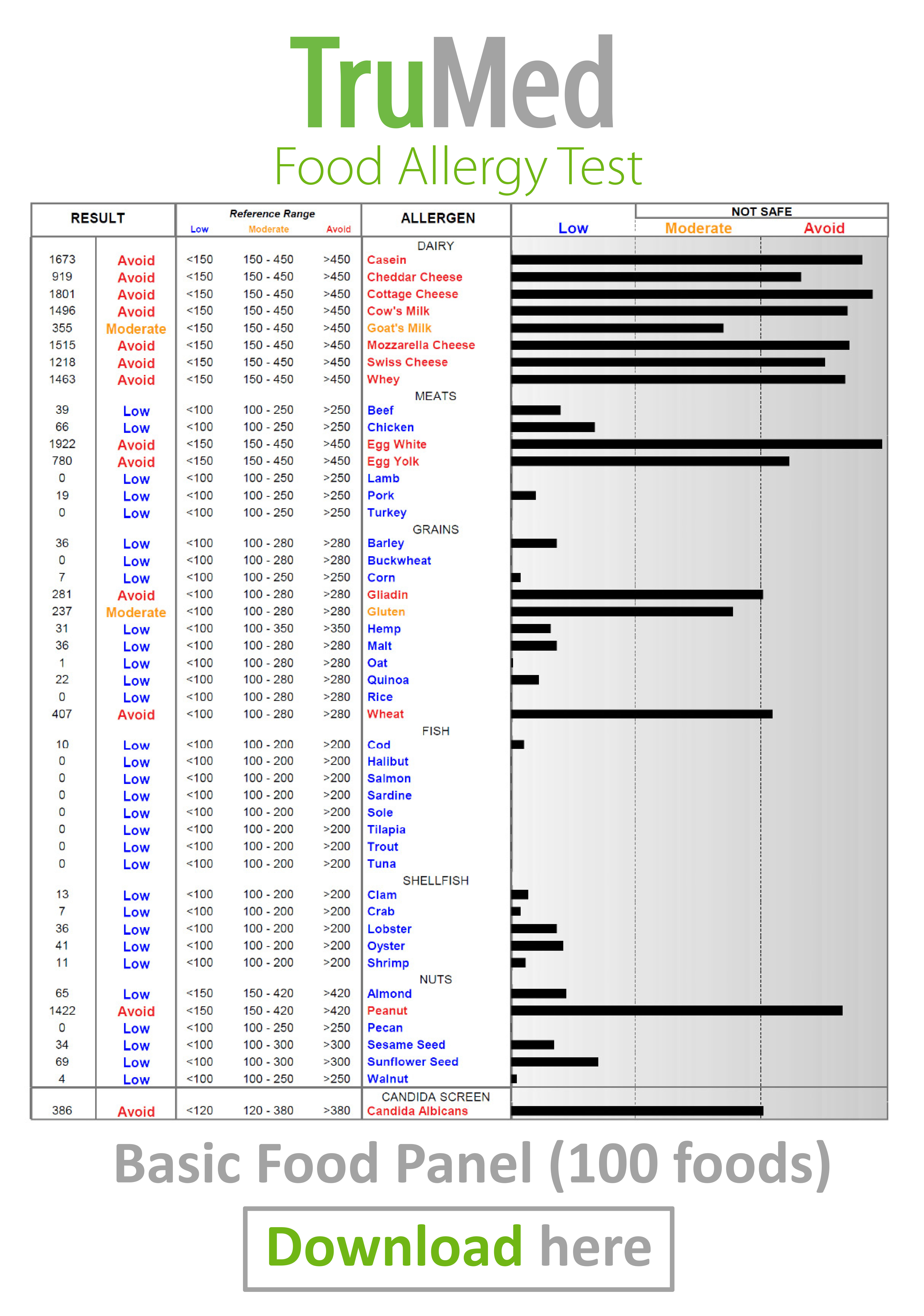
|
||||||||||||
Food Sensitivities, Allergies & Intolerances associated with: |
|
|
Gas & Bloating Asthma & Bronchitis |
Sinusitis IBS ASD Acne Frequent infections Rheumatoid Arthritis MS |
Interested in Testing?
Call Us
780 757-8378
Food Sensitivity & Allergy FAQ
How much does Food Sensitivity Testing cost?
Food Sensitivity Testing ranges from: $465 for 120 foods or $665 for 200 foods.
Food Allergy Testing is $365 for 50 foods, $465 for 100 foods and $665 for 200 foods.
However, both of our test costs include a brief consultation with one of our Naturopaths Doctors before testing and a brief follow up 1 month later to review your results.
Your TruMed Naturopath will help you determine the best test for you.
Our Food Allergy & Food Sensitivity Tests are often partially or fully re-imbursed by benefit plans.
See costs associated with our services.
What do your tests measure exactly?
Our labs measure your blood for antibodies produced in response to foods your consume.
We measure total IgG antibodies (IgG1 through IgG4) for food sensitivities or a combined IgE/IgG4 methodology for food allergies and occasionally we do an isolated IgE test as well.
It's normal to produce a small amout of antibodies in response to eating but when they are made in excess (and combine with the antigen and form a complex) they can deposit in various tissues and cause pathology.
We'll help you chose whether Food Allergy or Food Sensitivity Testing is better for your concerns.
IgG1, 2 & 3 are pro-inflammatory and activate the complement pathway. IgG4 is involved in the blunting of IgE mediated reactions.
IgG1 and IgG4 have both been implicated as dominating subclasses of antibodies to food antigens.
While IgG1 is an initial responder, IgG4 is produced following chronic exposure to the food.
IgE is the least abundant and is most commonly associated with rapid, sometimes life-threatening reactions.
What type of sample do you need?
We need a blood sample and we offer two types of sample collection.
For more rapid reactions and food allergies, we usually need to draw two vials of blood and we do this in-house.
For slower acting Food Sensitivity Testing we can often use a fingerprick collection which usually needs only 10-15 drops of blood.
How quickly do you get the test results?
For Food Sensitivity Testing we need to send the samples to Calgary.
For the Food Allergy Testing these are usually US bound tests and we typically need at least 3 and sometimes up to 4 weeks.
For domestic Food Sensitivity Testing, we usually need 2-3 weeks.
What's the difference between a Food Allergy and Food Sensitivity?
Strictly speaking, a Food Allergy is an immune based reaction to foods.
Of which, there are rapid, life threatening allergies that should be diagnosed by an allergist as well as slower acting allergies which are also termed sensitivities (type III hypersensitivities).
By definition, sensitivities are non-immune mediated reactions to foods like lactose intolerance.
However, the term is also used to denote non-life-threatening Food Allergies.
How accurate is the testing?
Our Naturopathic Doctors have run thousands of Food Allergy and Sensitivity Tests and have seen tremendous benefit in many patients.
Occasionally, the results don't entirely correlate with clinical end points but can often rule in or rule out the role of Food Sensitivity or Food Allergy in many cases.
Where have you been all my life?
We've been around!
But right now our Naturopath Clinic is on 119 street and 116th ave - "West Central Edmonton."
Pretty easy to access from anywhere in Edmonton - so technically we're Naturopaths near you :)
Supporting Studies:
IBS (2004)
A 2004 clinical trial with 150 IBS patients, were put on a diet based off of their IgG Food Sensitivity Test results.
After 12 weeks there was a 26% reduction in IBS symptom score in patients compliant on a diet based off of their Food Sensitivity Test results.
A 2005 study by Zar also found a significant improvement following IgG4 testing in IBS patients - this is test we use at our office sent to Washington.
By far most of our Food Sensitivity Testing clients in Edmonton are coming for IBS!
Migraine (2010)
In a 2010 clinical trial, 30 patients that were diagnosed with migraine without an aura had their Food Sensitivities detected via IgG antibodies analysis – same Food Sensitivity Testing that we use at TruMed.
The authors concluded diet restriction based on IgG Food Sensitivity Testing is an effective strategy in reducing the frequency of migraine attacks.
Our Naturopathic Doctors have seen lots of migraine sufferers improve from testing
Gastrointestinal Issues (2013)
Eighty-four subjects with "unresolved gastrointestinal issues" had their IgG Food Sensitivities tested.
Subjects eliminated all IgG reactive foods from their diet for 90 days
Quality of life (QoL) was assessed with the Irritable Bowel Syndrome-36 (IBS-36) and the Medical Outcomes Study Short Form-36 (SF-36) at baseline and 30, 60, and 90-day follow-up.
Subjects had statistically significant improvements in all indicators of QoL according to the IBS-36 and SF-36 from baseline to 90 day follow-up.
The authors concluded subjects with unresolved self-reported GI disorders were able to improve all indicators of QoL in response to eliminating IgG reactive foods from the diet.
Our Naturopaths have literally improved digestion in thousands of patients with FSTs
Allergy & Hives (2016)
A 2016 clinical trial looked at prevalence of Food Sensitivity among patients with allergic symptoms but were lacking laboratory evidence of allergy.
Seventy one patients with allergic symptoms of which 85.7% had hives were tested for IgG antibodies (the methodology we use at our Edmonton office).
The most frequently occurring food specific IgG antibodies were against cola nut in 80.3% of patients followed by yeast in 78.9%, wheat in 77.5%, red kidney bean in 71.8%, pea in 63.4%, corn in 62% and egg white in 62% of the patients.
Most interestingly, females had significantly higher food specific IgG antibodies.
We have seen improvements in chronic hives in many after undergoing Food Sensitivity Testing
Autoimmune Diseases (2018)
100 patients with autoimmune diseases were compared with 25 control patients.
IgG Food Sensitivity levels for were significantly higher in the patient group then in the control group.
Casein, cow's milk, wheat, gliadin, egg white and rice were most reactive.
The authors concluded: Food Intolerance Test is very important tool in patients with autoimmune disease, and should be performed in each patient to tailor an individual diet program.
However, we sometimes prefer Food Allergy Testing in patients with TH2 dominant autoimmune conditions.
Our Naturopaths test all of our Edmonton autoimmune patients for Food Sensitivities or Allergies.
Crohn's and Colitis (2019)
137 Inflammatory bowel disease patients compared to 50 healthy controls.
IgG food sensitivity antibodies were detected in 57.5% of Ulcerative Colitis patients, in 90.72% of Crohn's disease patients.
Rice, corn, tomato and soybean intolerance were most common.
However, because increased histamine concentrations, degranulated mast cells, eosinophils, and IgE-containing cells have been found in the mucosa of Crohn's patients, we also run IgG/IgE Food Allergy Testing in these patients.
There is one other study on Crohn's disease by Bentz (2010) showing major benefit from Food Sensitivity Testing.
A 2010 study by Rajendran also showed benefit of IgG4 testing in Crohn's patients as well.
We've seen many IBD patients benefit from Food Allergy & Sensitivity Testing at our Edmonton Clinic
Depression (2019)
184 adolescent patients who were experiencing their first episode of a depressive disorder were tested for numerous factors including 14 different types of food antigen-specific IgG Food Sensitivity Antibodies.
Over 80% of patients exhibited prolonged Food Intolerance with elevated levels of serum histamine.
Therefore, there would be benefit to running either Food Sensitivity or Food Allergy Testing in these patients.
We've observe energy and mood can improve once sensitive foods are found and removed
Top reasons for testing:
|
IBS Our Naturopaths see many clients looking for help with their digestion. Food Sensitivity Testing can provide answers about which foods agree with your body. |
|
|
Rashes Figuring out reactive foods is a starting point for our Naturopathic Doctors when trying to skin issues like eczema, hives and psoriasis. |
|
|
Breathing issues Our Naturopaths often run testing to provide answers for chronic and sinus and lung issues like asthma, phlegm and chronic bronchitis. |
|
|
General health We've had lots of people in Edmonton seeking food testing to improve their health and provide structure to their diet to feel their best! |
|
You can book in just for Food Sensitivity Testing
Your testing appointment includes a consultation with our Naturopaths |
More Supporting Studies:
Skin, Breathing & Digestion (2019)
312 patients who were experiencing either Skin, Respiratory, Digestive and Nervous System issues were tested for 14 foods using the IgG food sensitivity methodology.
The highest sensitivity rates were found in crab, followed by shrimp, eggs and milk.
We have also seen numerous patients improve with symptoms in these areas after Food Allergy Testing.
Skin, Breathing and Digestion commonly improve after Sensitivity & Allergy testing
MS (2023)
A 2023 study looked at prevalence of Food Sensitivity among patients with Multiple Sclerosis.
This group screened 35 patients with MS and 20 healthy controls for their IgG reactivity against an array of animal-sourced milk, plant-based alternatives as well as individual antigens from cow's milk.
Cow, goat, sheep, A2 milk, coconut, cashew, almond, hazelnut and oat milk were studied.
The MS patients exhibited a significantly higher IgG response to cow milk and goat milk compared to healthy donors, with cow's milk being higher likely related to more reactivity to A1 beta-casein.
Correlation data indicated the co-existence of antibodies to individual bovine milk antigens and their corresponding cross-reactive CNS antigens.
Working with diet is an important cornerstone technique that we use with our MS patients
Crohn's (2024)
A 2024 observational study looked at prevalence of Food Sensitivity among patients with Crohn's Disease.
Ninety six patients with Crohn's were tested for IgG antibodies and their association small bowel inflammation.
81.3% of Crohn's patients were detected positive for at least one food-specific antibody. The five most prevalent antibodies were tomato, egg, corn, rice, and soybean.
Patients with small intestine inflammation had a higher positive rate of food IgG antibodies and more IgG-positive food items with egg, corn and wheat as the top reactors.
The authors concluded "Our study confirmed that Crohn's patients with small bowel inflammation had a higher positive rate of food IgG antibodies."
Many patients with Crohn's benefit substantially after undergoing Food Sensitivity Testing

